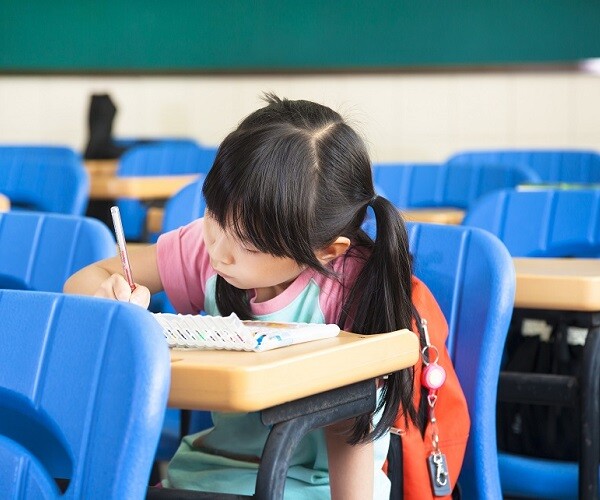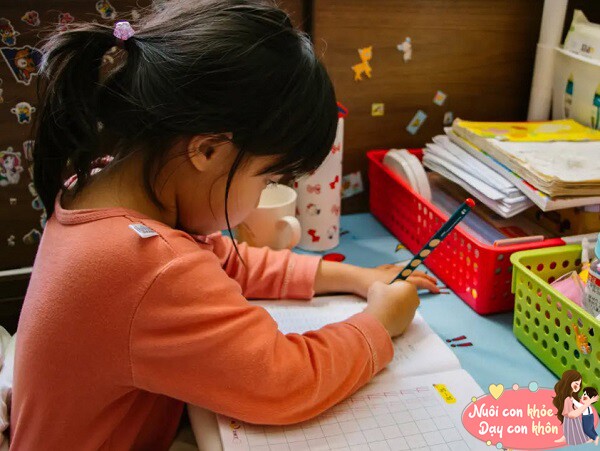If you observe children closely at this stage, you’ll notice that those with these five habits tend to perform better academically in elementary school compared to kindergarten.


Sense of Responsibility for Themselves
Entering elementary school means children need to set aside a dedicated amount of time for studying.
They learn to take care of their well-being at school, such as drinking water on time, using the restroom, and eating properly…
Parents can’t remind their children about these things all the time. If children have a sense of self-responsibility, they will know how to take care of their health, safety, and studies.
In reality, it’s only a matter of time before children adapt to life in elementary school. The more parents get involved, the less opportunity children have to develop independence.

Sense of Responsibility for Themselves.
What parents should do is learn to let go.
For example: Let your child pack their own bag and eat independently at home.
Encourage them to plan their time for play or homework before and after school.
When it comes to homework, first create a general plan with your child and estimate the time needed for completion without constant supervision. Parents can read, do chores, etc., but it’s best to avoid engaging in too many leisure activities that might distract the child.
The role of parents is not to prevent their children from making mistakes but to turn those mistakes into learning opportunities.
Let your child take on tasks they are capable of. Children are more capable than we think, and when they have a sense of self-responsibility, they will proactively cope with changes in their lives.

Wise Time Management
As children enter elementary school, they may face a phase of time scarcity and chaotic daily life.
Parents often worry: Can their child sit still for 40 minutes in class? What if they need to use the restroom during class? What if they struggle with balancing studies and play?
Children with a sense of time management will find it easier to organize their studies and daily life. A significant difference between kindergarten and elementary school is that kindergarten tends to be less restrictive and mostly allows children to explore and play freely.
However, in elementary school, there will be classroom discipline, academic tasks, demands, and pressure.
How should children allocate time for homework after school? How can they balance play and study?
This is a significant challenge for children. Improper time management leads to a chaotic daily life, and every day becomes a race against time.
Therefore, if children can manage their time wisely, they will have time for both play and completing their homework orderly.

Learning to Manage Time Wisely.

Organizing and Arranging Study Materials Efficiently
Turns out, keeping study materials organized and tidy also requires awareness and skills.
A child’s clear thinking and organizational skills are heavily influenced by their family environment and their parents’ habits.
If children can organize their stationery, backpack, and study desk (both at school and home) neatly, parents will worry less, and children will be less likely to lose their belongings.
For instance, encourage your child to sharpen their pencils at home, so they don’t have to rush to do it in class. Or, use colored file folders for different subjects: red for Language, green for Math, etc. This way, things won’t get lost or mixed up, and children won’t spend too much time searching for their belongings. Children with the habit of organizing and keeping things tidy tend to have clearer thinking.

Chores
A Harvard University professor conducted a 20-year survey of 456 children in the Boston area and drew a conclusion.
Compared to children who dislike doing chores, those who regularly help with household tasks had a 1:15 unemployment rate and a 1:10 crime rate as adults. Their average income was 20% higher, and they also had lower divorce and mental illness rates. In fact, there are numerous examples showing that children who excel academically but lack practical skills often struggle to adapt to society.
Assigning age-appropriate chores is beneficial for a child’s development.
– It can give them a stronger sense of belonging and make them feel like an integral part of the family.
– Rights and obligations go hand in hand. The entire family shares the results of household chores.
– Chores engage both the hands and the brain, providing a comprehensive learning experience for children.
Children who are accustomed to doing chores tend to be more capable of self-care and have a stronger sense of teamwork.

The Habit of Doing Chores.

Self-Protection Awareness
The school compound is a microcosm of society, and conflicts can arise.
As children enter elementary school, they need to develop a strong sense of personal safety, as well as awareness of social, sports, and traffic safety, among others.
In 2016, a special survey of over 9,000 elementary and middle school students (urban and rural) in Shandong Province, China, found that 14.9% of the students reported being bullied.
When children experience physical and mental harm, they may develop a negative attitude towards school and studies.
Therefore, it’s essential to instill self-protection awareness and teach them to recognize potential dangers. This way, they can significantly reduce safety risks through preventive measures.







































